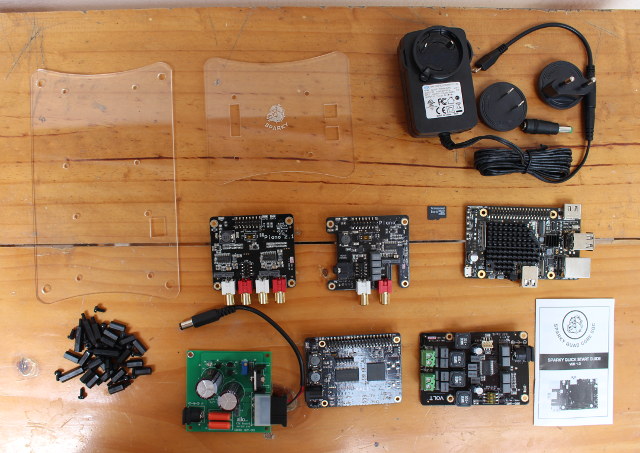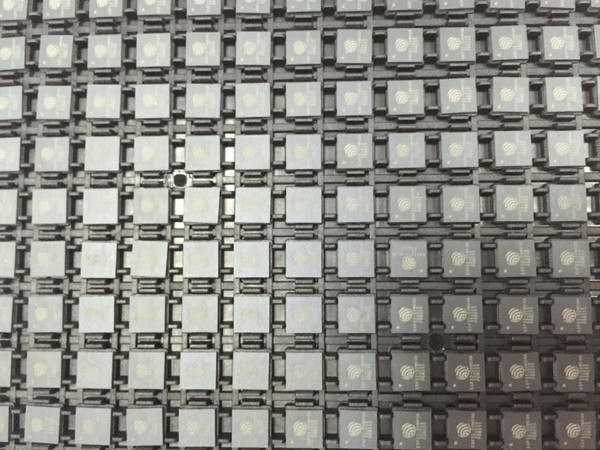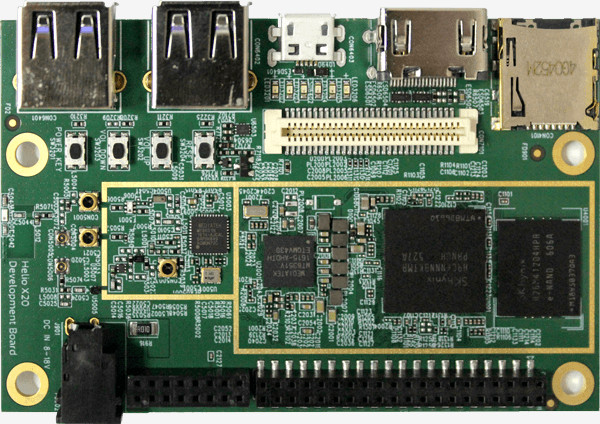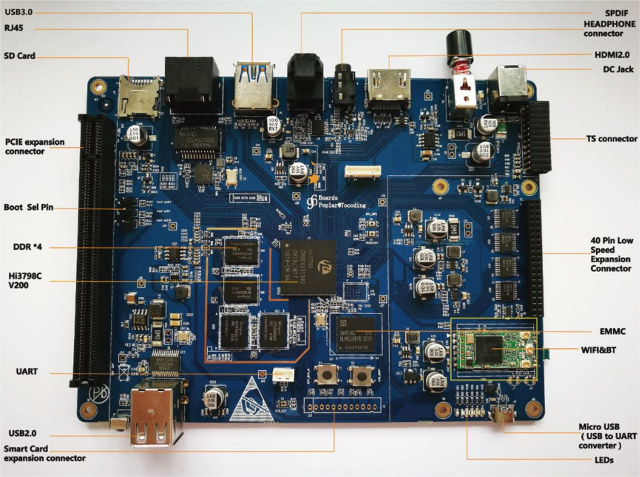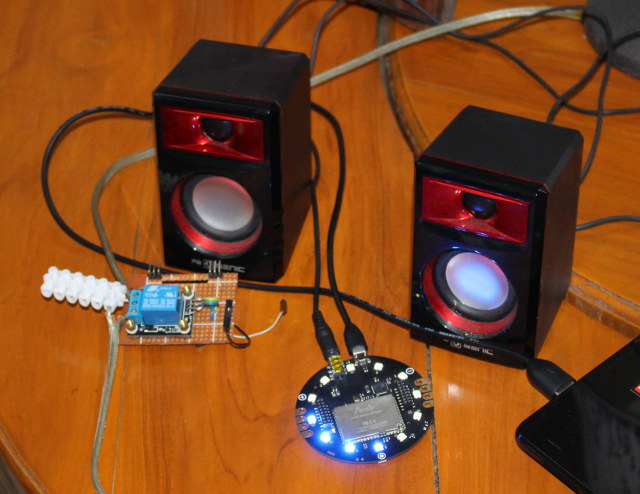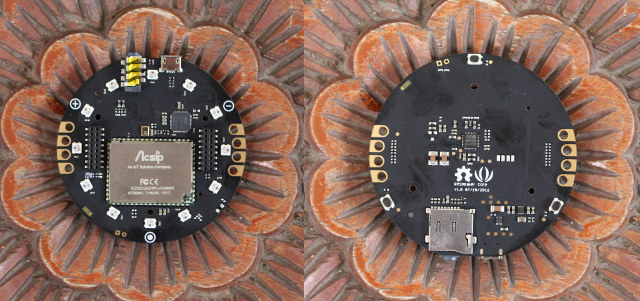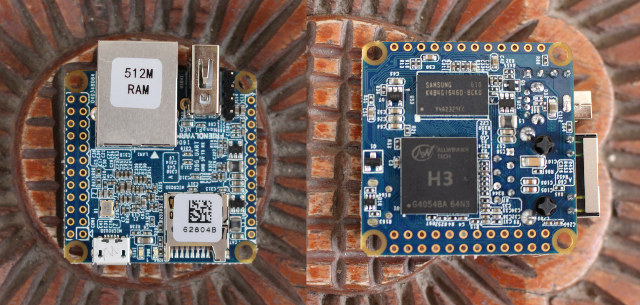Last year I wrote about Allo Sparky SBC Linux and Android development powered by Actions Semi S500 quad core Cortex A9 processor, which mostly differentiates itself from the competition by the many add-on boards for audio, VoIP, and IoT (WiFi+Bluetooth+Zigbee ). While most of development boards are manufactured in China, Allo company is based in India, and all boards are manufactured there, which could be a benefit to Indian readers who want to avoid potential custom issues with other boards. The company has shipped me their complete audio development kit, and I’ll first check out the hardware, before taking time to experiment with the kit in a few weeks or months… I could find 6 different boards in the kit, which I detailed below, as well as a 5V/3A power supply with AU and EU adapter, a micro USB adapter, a micro SD card apparently pre-loaded with Ubuntu 12.04, a […]
Espressif ESP32 WiFi & Bluetooth SoC is Now Up For Sale for $2.85
Espressif ESP32 is one of the most awaited chip for IoT applications as it combines a dual core processor, WiFi, Bluetooth 4.0, and various I/Os. The good news is that you can now purchase ESP32 for 19 RMB ($2.85) on Taobao, or if you are not based in China, contact Espressif by email at sales [at] espressif.com. Availability is however limited, and the maximum order is now 5 pieces. ESP32 modules and boards, as opposed to just the SoC, are not quite ready right now, but should become available in a few weeks. ESP-WROOM-32 is the ESP32 module developed by Espressif, and NodeMCU is also working on an ESP32 board, so we’ll get more good news very soon. You can also find documentation, hardware and software resources on a Espressif ESP32 page , including a getting started guide, ESP32 SDK, ESP32 reference manual, ESP-WROOM-32 datasheet, and more. If you are […]
96Boards Compliant Mediatek X20 Development Board is Now up for Sale for $199
Mediatek Labs and Linaro introduced X20 development board based on 96Boards CE specs, and featuring Mediatek Helio X20 deca-core Cortex A72/A53 processor a couple of months ago. At the time, if you wanted to purchase the board, you’d have to fill a form explaining the details about your project, and the company, Alpha Star, would then decided whether would sell it to you. The good news here is that you don’t need to do any of that anymore, and you can buy the board directly on Seeed Studio for $199, or on Taobao for 1399 RMB. Mediatek X20 development board specifications have not changed much since the first announcement, but the CPU and GPU frequencies have been lowered somewhat, and we have some more details: SoC – Mediatek Helio X20 (MT6797) deca-core processor with two ARM Cortex A72 cores @ 2.1~2.3 GHz, four Cortex A53 @ 1.85 GHz, four Cortex […]
$79 HiSilicon Poplar is the First 96Boards TV Platform Compliant Board
At the end of last month I wrote about 96Boards TV Platform specifications, and noticed Hisilicon had one such boards, but details were sparse. Linaro has now officially unveiled HiSilicon Poplar board, the first 96Boards TV Platform board, sold for $79 + shipping on Aliexpress. Poplar board specifications: SoC – HiSilicon Hi3798C V200 quad-core 64-bit ARM Cortex-A53 CPU up to 2.0 GHz per core with ARM Mali-T720 GPU supporting OpenGL ES 3.1/3.0/2.0/1.1/1.0, OpenVG 1.1, OpenCL 1.2/1.1 Full Profile, RenderScript, and Microsoft DirectX 11 FL9_3 Memory – 1 or 2 GB DDR3 (Specs are conflicting depending where you look) Storage – 8GB eMMC flash + micro SD card slot Video Output – HDMI 2.0a with HDCP 2.2 up to 4K @ 60Hz Video Decoding – H.265/HEVC Main/Main10 and VP9 up to 4K @ 60 fps Audio Output – HDMI, optical S/PDIF, 3.5mm audio jack Connectivity – Gigabit Ethernet, 802.11 b/g/n/ac WiFi […]
C.H.I.P Board and Allwinner A13/R8 SoCs To Get VPU Support in Linux Mainline
Allwinner has mixed relationships with open source communities such as Kodi, especially due to issues with its closed-source CedarX VPU drivers, and some GPL violations. However to address the former, linux-sunxi community has been working on open source Cedrus library for the video processor unit on Allwinner processors, that’s been successfully tested on boards such as Orange Pi One. Free Electrons has gone further, as they’ve made sure Cedrus now works with Linux mainline kernel, currently Linux 4.8, and tested it on Allwinner R8 based Pocket CHIP. The work has been done by Florent Revest, a 19 years old intern at the company, who delivered a new sunxi-cedrus driver, a Video4Linux (V4L2) memory-to-memory decoder kernel driver, and corresponding VA-API backend, with the implementations currently available on Github here and there respectively. Currently only MPEG2 and MPEG4 are working, but adding other codecs such as H.264, and video encoding is possible […]
Getting Started with ReSpeaker WiFi IoT Board’s Audio Capabilities, Voice Recognition and Synthesis
ReSpeaker is a development board combining an Atmel AVR MCU, a MediaTek MT7688 WiFi module running OpenWrt, a built-in microphone, an audio jack, and I/O headers to allow for voice control and output for IoT applications. That means you could make your own Amazon Echo like device with the board and add-ons, use it as a voice controlled home automation gateway and more. The board was launched on Kickstarter a few days ago, and already raised $100,000 from about 100 backers, but I’ve received an early sample, so I’ll provide some more information about the firmware, and shows how to use with some Python scripts leveraging Microsoft Bing Speech API. You’ll need a micro USB to USB cable to connect your to computer (Linux, Windows, Mac OS…), and a speaker to connect to the board. Linux (OpenWrt) boots in a few seconds, and once it’s done all RGB LED will […]
ReSpeaker WiFi IoT Board is Designed for Voice Interaction (Crowdfunding)
More and more devices are supporting voice interaction nowadays from your smartphone to devices like Amazon Echo, but so far, I had not seen development boards specifically designed for that purpose, and that’s exactly what Seeed Studio ReSpeaker board does by combining audio capabilities, WiFi connectivity, and I/O headers. ReSpeaker Core board specifications: WiFi Module – Acsip AI7688 Wi-Fi 802.11 b/g/n module based on Mediatek MT7688 MIPS SoC Storage – micro SD card slot USB – 1x micro USB port for programming and power Audio – 3.5mm AUX port, WM8960 audio codec, 2-pin header for external speakers Expansion – 2x 8-pin expansion headers for I2C, GPIO and USB 2.0 host connected to MT7688, built-in microphone. MCU – Atmel ATMega32U4 @ 16 MHz Misc – 12x RGB LEDs, 8x touch sensors, 3 push buttons Power Supply – 5V DC Dimensions – 70mm diameter Weight – 70 grams The board runs OpenWrt, […]
NanoPi NEO Board Gets Armbian Debian 8 & Ubuntu 16.04 with Linux 4.6 & 4.7 (Mainline), h3consumption Power Consumption Tool
We’ve been blessed with a wide range of low cost Allwinner H3 boards thanks to Shenzhen Xunlong Orange Pi and FriendylARM NanoPi boards. Recently, armbian developers have been focusing on NanoPi NEO board, and they’ve now released Debian Jessie and Ubuntu Xenial with Linux 4.6.7 and Linux 4.7.2. The latter is mainline kernel with some patchsets for Ethernet. You can download the Linux 4.6.7 based “beta” images from armbian NanoPi NEO page, and selected the “Vanilla” versions, then flash then one a micro SD card as you would normally do. Linux 4.7.2 based “experimental” images with USB OTG support and schedutil cpufreq governor can be found on the separate server in a temporary directory. Thomas Kaiser explains further: Ethernet and throttling are working (the latter not as efficient as with legacy kernel but at least it protects the SoC from overheating). Please note that all vanilla kernel images currently suffer from […]


